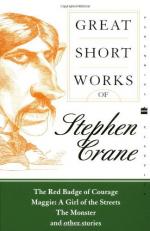|
This section contains 11,588 words (approx. 39 pages at 300 words per page) |

|
SOURCE: Morgan, William M. “Between Conquest and Care: Masculinity and Community in Stephen Crane's ‘The Monster.’” Arizona Quarterly 56, no. 3 (autumn 2000): 63-92.
In the following essay, Morgan explores the constitution of white masculinity in “The Monster” and how this is called into question through division of community.
“The Monster” (1897) was penned while Stephen Crane lived in exile in England and shortly before he made his mark as a front-line reporter during the Spanish-American War. The novella records Crane's ambivalence toward the strenuous ethos of white masculinity that Theodore Roosevelt championed and came to embody, and that Crane often represented in his journalism during the 1890s. TR's triumph over his own sickly Victorian adolescence and then over the bodies of racial others to become a “Rough Rider” is perhaps the Anglo-American story of masculinist ideology the nation has inherited from the cultures Crane experienced. Roosevelt, in his zeal to spread...
|
This section contains 11,588 words (approx. 39 pages at 300 words per page) |

|


